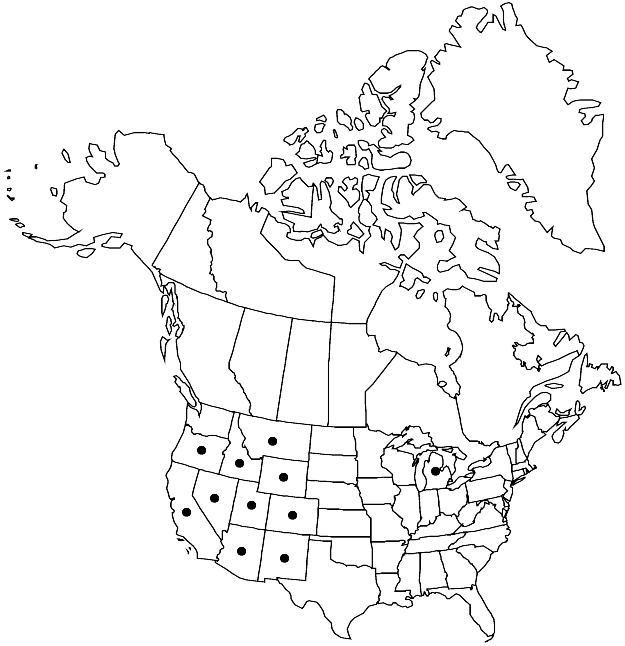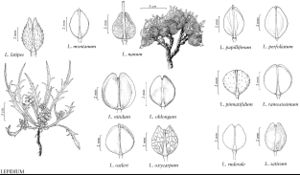Lepidium montanum
in J. Torrey and A. Gray, Fl. N. Amer. 1: 116. 1838.
Annuals, biennials, or perennials; (cespitose or not, woody or not at base); glabrous or pubescent. Stems simple to several from base, erect to ascending, often branched (several) distally, 0.4–5(–7) dm. Basal leaves rosulate or not; petiole (0.5–)1.2–5.3(–7.6) cm; blade 1- or 2-pinnatifid to pinnatisect, or, rarely, undivided, (0.8–)1.5–4(–6) cm, margins (of lobes) entire or dentate. Cauline leaves shortly petiolate; blade similar to basal, or undivided and linear, smaller distally, base cuneate to attenuate, not auriculate. Racemes often much-elongated in fruit; rachis usually puberulent, rarely glabrous, trichomes straight or curved, cylindrical. Fruiting pedicels divaricate to horizontal, slightly recurved or somewhat sigmoid, (terete), (2.7–)3.3–8.5(–10) × 0.2–0.3 mm, sparsely to densely puberulent adaxially. Flowers: sepals oblong to broadly ovate, 1.2–1.8(–2.1) × 0.8–1.2 mm; petals white, spatulate to oblanceolate, 2.2–3.7(–4.3) × 1.3–1.8 mm, claw 1–1.4 mm; stamens 6; filaments 1.4–2.2 mm, (glabrous); anthers 0.4–0.5 mm. Fruits usually ovate to suborbicular, rarely oblong, 2–4.3(–5) × (1.5–)1.8–3.6(–4) mm, apically winged, apical notch 0.1–0.3 mm deep; valves thin, smooth, not veined, usually glabrous, rarely puberulent; style obsolete 0.2–0.7(–0.9) mm, usually exserted beyond, rarely subequaling, apical notch. Seeds oblong, 1.2–1.8 × 0.7–1 mm. 2n = 32.
Phenology: Flowering Apr–Aug.
Habitat: Pinyon-juniper woodlands, sagebrush and other shrub communities, rocky hillsides and crevices, bajadas, spring seepages, washes, gypseous grounds, sandstone cliffs, limestone gravel, playas, knolls, gumbo hills, sandy areas, alkaline flats and lowlands, roadsides
Elevation: 1200-2700 m
Distribution

Ariz., Calif., Colo., Idaho, Mich., Mont., Nev., N.Mex., Oreg., Utah, Wyo.
Discussion
There is little agreement among North American authors as to the characters emphasized, the number of infraspecific taxa, their ranks, and their synonymies in treatments of Lepidium montanum. C. L. Hitchcock (1936) divided the species into 13 varieties and two forms, and later (Hitchcock 1950) further expanded its limits to include 15 subspecies and two varieties. His circumscription was so broad that it involved at least eight taxa accepted as different species by R. C. Rollins (1993), N. H. Holmgren (2005b), and us. These include L. alyssoides, L. barnebyanum, L. crenatum, L. davisii, L. eastwoodiae, L. integrifolium, L. montanum, and L. papilliferum.
Although the recognition of seven of Hitchcock’s infraspecific taxa as distinct species helped somewhat in reducing heterogeneity in Lepidium montanum, this species complex remains far from being adequately treated in recent monographic (R. C. Rollins 1993) or floristic (N. H. Holmgren 2005b) works. In all, 12 varieties remain accepted in the species, and these only partially cover its overall complexity. The characters that various authors emphasized in the delimitation of infraspecific taxa include duration, habit, plant height, indumentum density, division of basal and cauline leaves, leaf shape, and fruit size. Indeed, the species is so highly variable in all of these aspects that the overall number of forms is mind boggling. Holmgren’s assessment that there are intermediates between the various varieties, even in areas where they do not overlap, is correct. The species is badly in need of thorough biosystematic and molecular studies to determine the number and range of infraspecific taxa, to discern the patterns of variation, and to determine how distinct the species is from the seven segregates mentioned in the previous paragraph.
Some of the varieties (e.g., alpinum, coloradense, montanum, neeseae, and stellae), all of which were accepted by both R. C. Rollins (1993) and N. H. Holmgren (2005b), are distinct enough, and merit recognition at some rank. As indicated by Rollins, var. neeseae is quite distinct from the rest and should perhaps be treated as a separate species, but we have seen only two isotypes, and neither had fully developed fruits. Without a painstaking study of this entire species complex, we prefer not to accept formally only a small fraction of its enormous variation. This does not mean that leaving the species as such is the ideal solution, and the listing of synonyms above is meant solely to guide the reader into the complexity involved. A workable and satisfactory key to all of the varieties is not possible at the current stage of knowledge, and attempts to make one (e.g., Rollins, Holmgren) have been unsuccessful. The Michigan record is based on an introduction more than 70 years ago.
